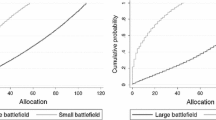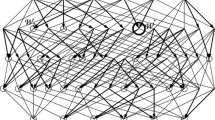Abstract
The Battle of the Sexes game, which captures both coordination and conflict problems, has been applied to a wide range of situations. We show that, by reducing distributional conflict and enhancing coordination, (eventual) turn taking supported by a “turn taking with independent randomizations” strategy allows players to engage in intertemporal sharing of the gain from cooperation. Using this insight, we decompose the benefit from turn taking into conflict-mitigating and coordination-enhancing components. Our analysis suggests that an equilibrium measure of the “degree of intertemporal conflict” provides an intuitive way to understand the sources of welfare gain from turn taking in the repeated Battle of the Sexes game. We find that when this equilibrium measure is lower, players behave less aggressively and the welfare gain from turn taking is higher.
Similar content being viewed by others
References
Aumann R.J. (1974) Subjectivity and crrelation in randomized strategies. Journal of Mathematical Economics 1:67–96
Berkes F. (1992) Success and failure in marine coastal fisheries of Turkey. In: Bromley D.W. (ed). Making the Commons Work: Theory, Practice, and Policy. San Francisco, Institute for Contemporary Studies, pp. 161–182
Besen S., Farrell J. (1994) Choosing how to compete: strategies and tactics in standardization. Journal of Economic Perspectives 8(2):117–131
Bhaskar V. (2000) Egalitarianism and efficiency in repeated symmetric games. Games and Economic Behavior 32:247–262
Bornstein G., Budescu D., Zamir S. (1997) Cooperation in intergroup, N-person, and two-person games of chicken. Journal of Conflict Resolution 41:384–406
Camerer C. (2003) Behavioral Game Theory: Experiments in Strategic Interaction. Princeton, Princeton University Press
Cooper R., DeJong D.V., Forsythe R., Ross T.W. (1989) Communication in the Battle of the Sexes Game: some experimental results. Rand Journal of Economics 20:568–587
Cooper R., DeJong D.V., Forsythe R., Ross T.W. (1993) Forward induction in the Battle-of-the-Sexes Games. American Economic Review 83(5):1303–1316
Crawford V.P., Haller H. (1990) Learning how to cooperate: optimal play in repeated coordination games. Econometrica 58:571–595
Dixit A., Shapiro C. (1986) Entry dynamics with mixed strategies. In: Thomas L.G. (ed). The Economics of Strategic Planning. Lexington, Lexington Books, pp. 63–79
Dixit A., Skeath S. (2004) Games of Strategy, Second Edition. New York, W. W. Norton & Company
Farrell J. (1987) Cheap Talk, Coordination, and Entry. Rand Journal of Economics 18:34–39
Farrell J., Rabin M. (1996) Cheap talk. Journal of Economic Perspectives 10:103–118
Friedman J.W. (1994) Introduction and overview. In: Friedman J.W. (ed). Problems of Coordination in Economic Activity. Boston, Kluwer Academic Publishers, pp. 3–15
Fudenberg D., Maskin E. (1986) The folk theorem in repeated games with discounting or with incomplete information. Econometrica 54:533–554
Fudenberg D., Maskin E. (1991) On the dispensability of public randomization in discounted repeated games. Journal of Economic Theory 53:428–438
Lau S.-H.P. (2001) Aggregate pattern of time-dependent adjustment rules, II: strategic complementarity and endogenous nonsynchronization. Journal of Economic Theory 98:199–231
Lau, S.-H.P. and Mui, V.-L. (2006) Using Turn Taking to Mitigate Coordination and Conflict Problems in the Repeated Battle of the Sexes Game, Working Paper, University of Hong Kong and Monash University. (http://www.econ.hku.hk/~pshlau/papers.html).
Lau, S.-H.P. and Mui, V.-L. (2007) Turn Taking: Intertemporal Cooperation and Symmetry through Intratemporal Asymmetry, Working Paper, University of Hong Kong and Monash University. (http://www.econ.hku.hk/~pshlau/papers.html).
Luce R.D., Raiffa H. (1957) Games and Decisions: Introduction and Critical Survey. New York, Wiley
Muller R.A., Sadanand A. (2003) Order of play, forward induction, and presentation effects in two-person games. Experimental Economics 6:5–25
Ostrom, E., Gardner, R. and Walker, J. (with Agrawal, A., Blomquist, W., Schlager, E., and Tang, S.Y.) (1994) Rules, Games, and Common-Pool Resources, Ann Arbor: University of Michigan Press.
Sorin S. (1986) On repeated games with complete information. Mathematics of Operations Research 11:147–160
Author information
Authors and Affiliations
Corresponding author
Rights and permissions
About this article
Cite this article
Lau, SH.P., Mui, VL. Using Turn Taking to Mitigate Coordination and Conflict Problems in the Repeated Battle of the Sexes Game. Theory Decis 65, 153–183 (2008). https://doi.org/10.1007/s11238-008-9100-8
Received:
Accepted:
Published:
Issue Date:
DOI: https://doi.org/10.1007/s11238-008-9100-8




